2023届高三语法总复习总结之it的用法总结课件(共37张PPT)
文档属性
| 名称 | 2023届高三语法总复习总结之it的用法总结课件(共37张PPT) |  | |
| 格式 | zip | ||
| 文件大小 | 1.5MB | ||
| 资源类型 | 教案 | ||
| 版本资源 | 人教版(2019) | ||
| 科目 | 英语 | ||
| 更新时间 | 2023-03-07 07:49:10 | ||
图片预览

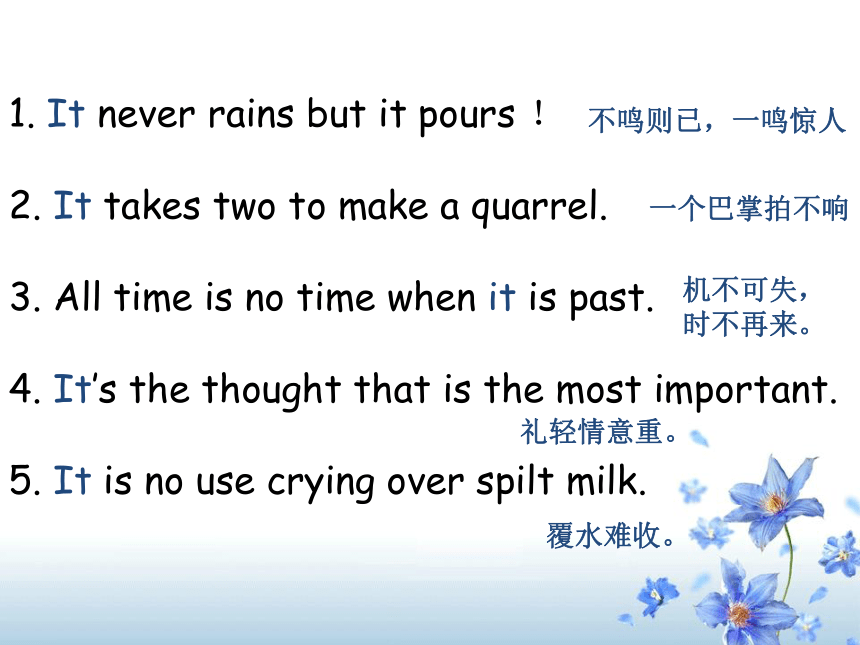
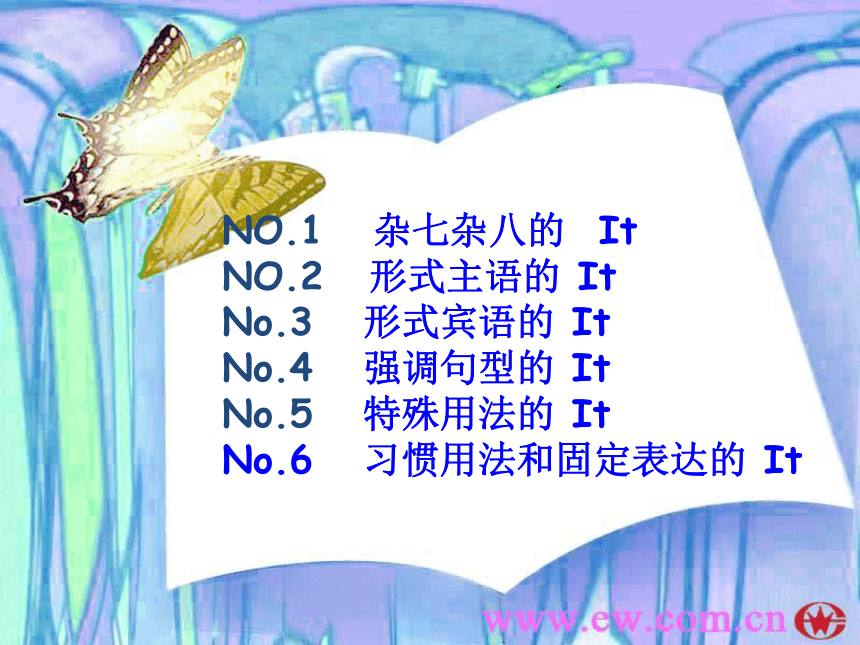
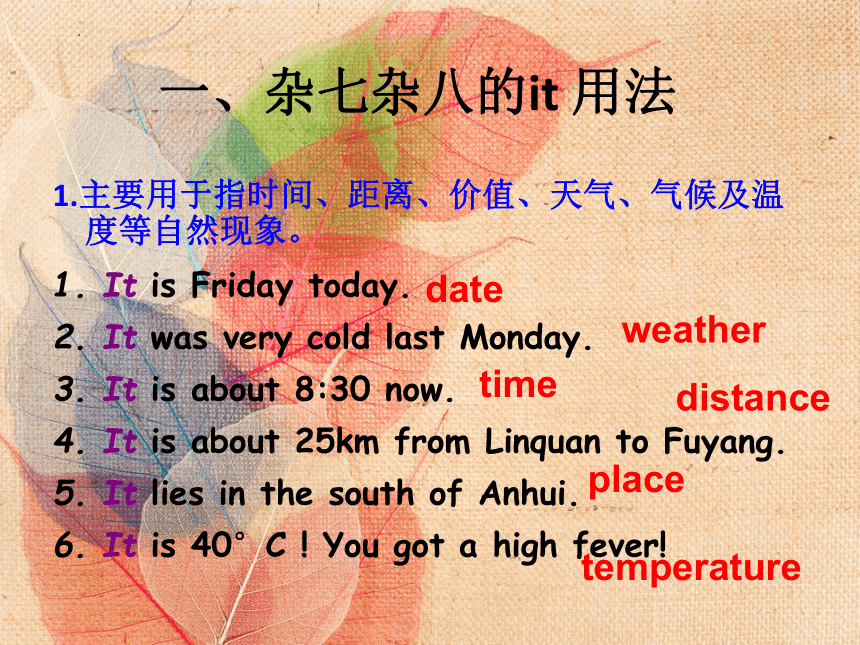
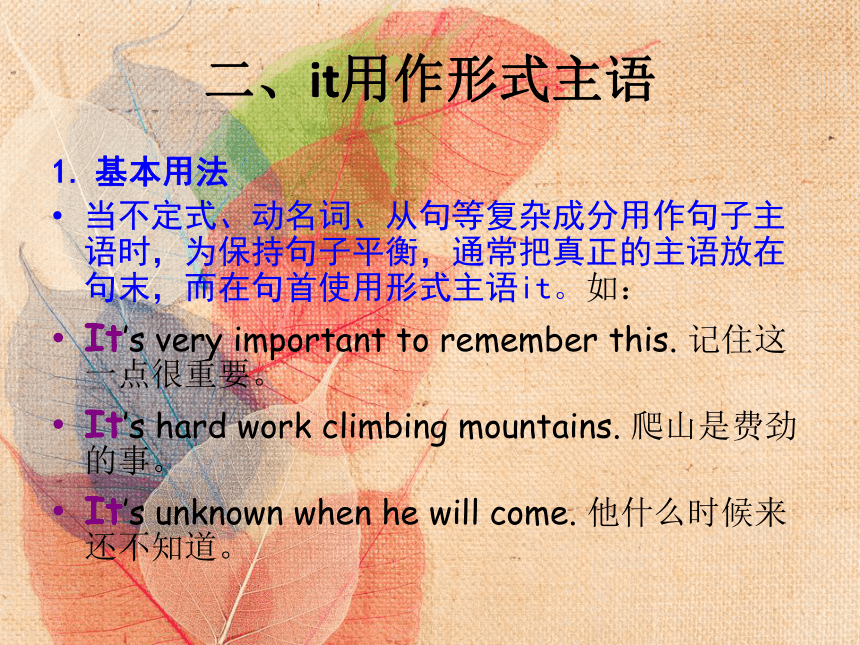
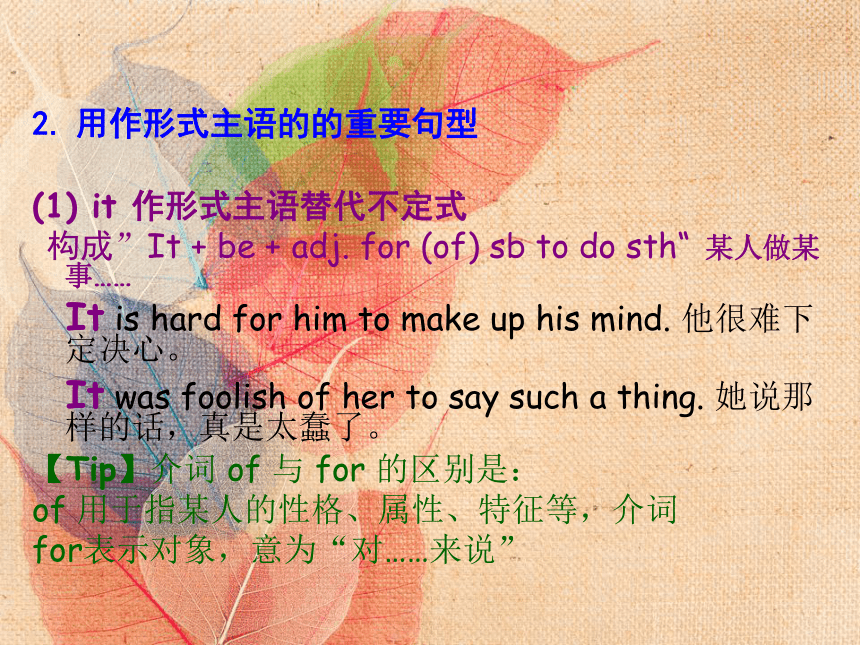
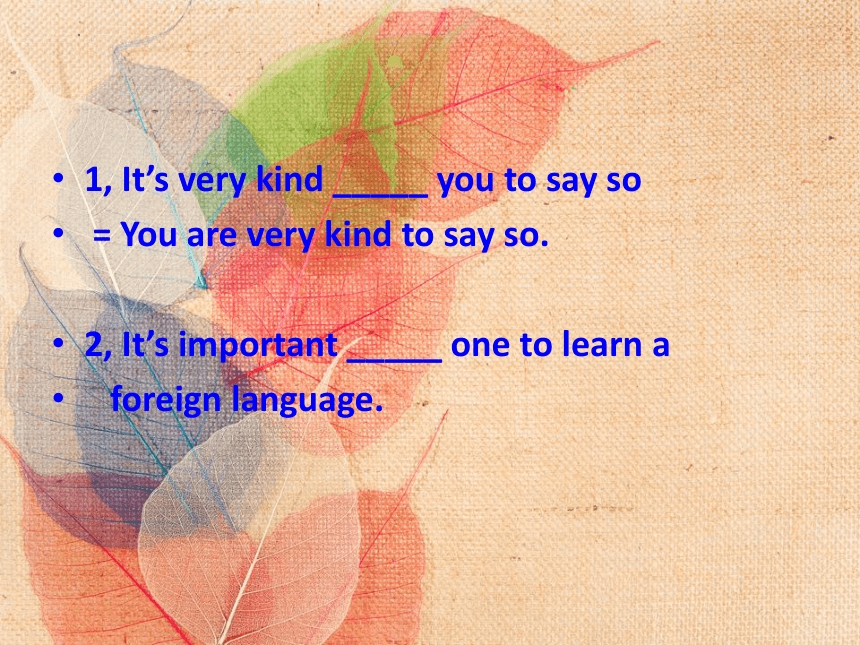

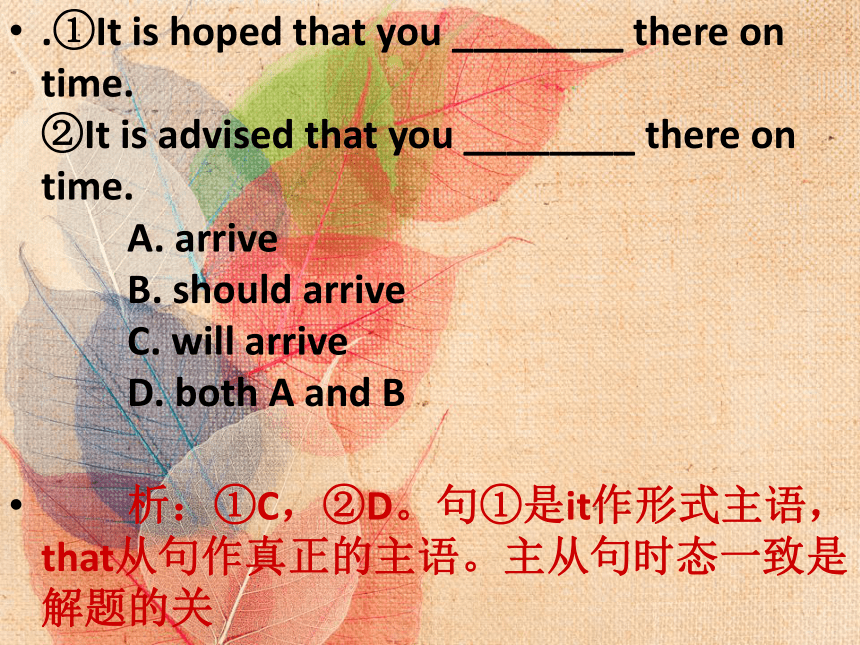
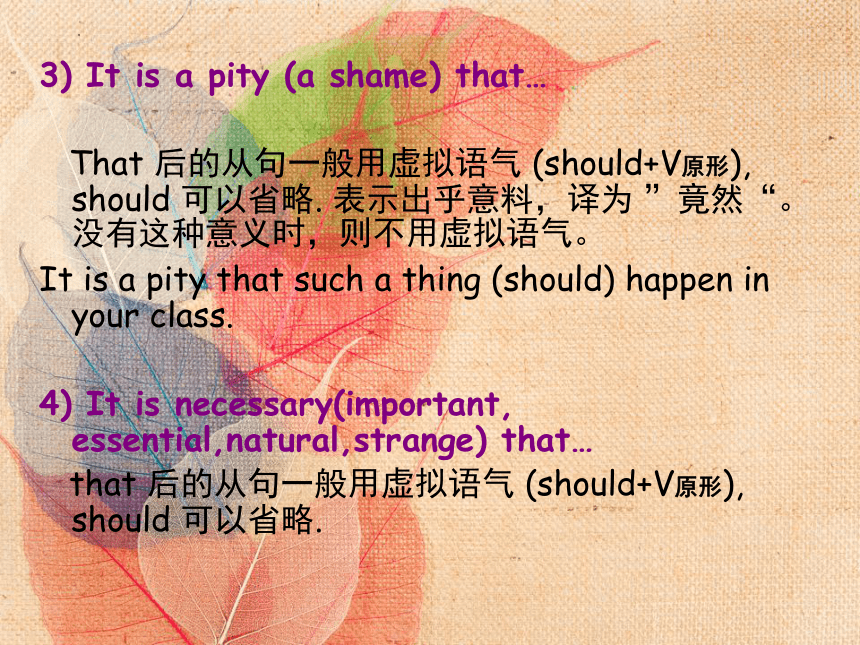
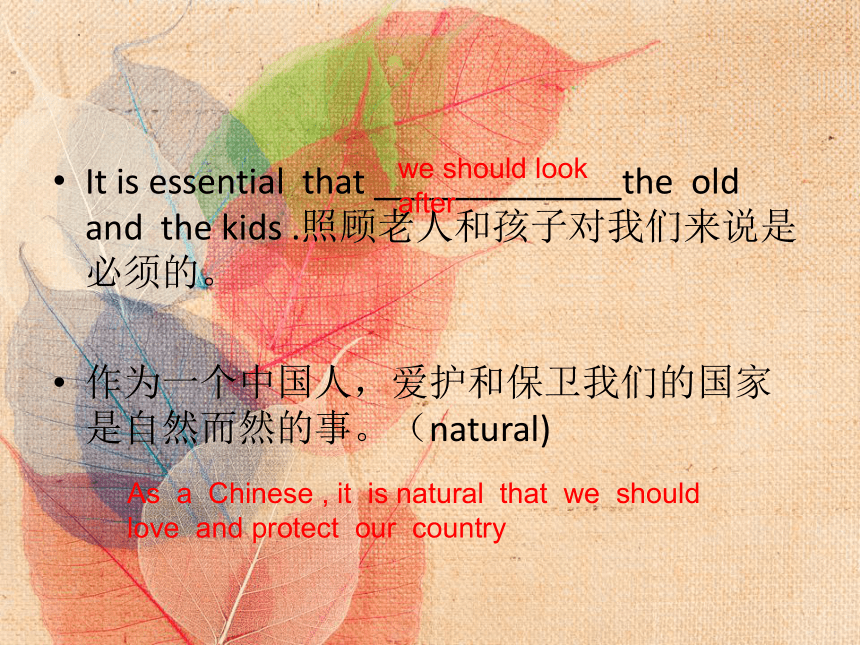
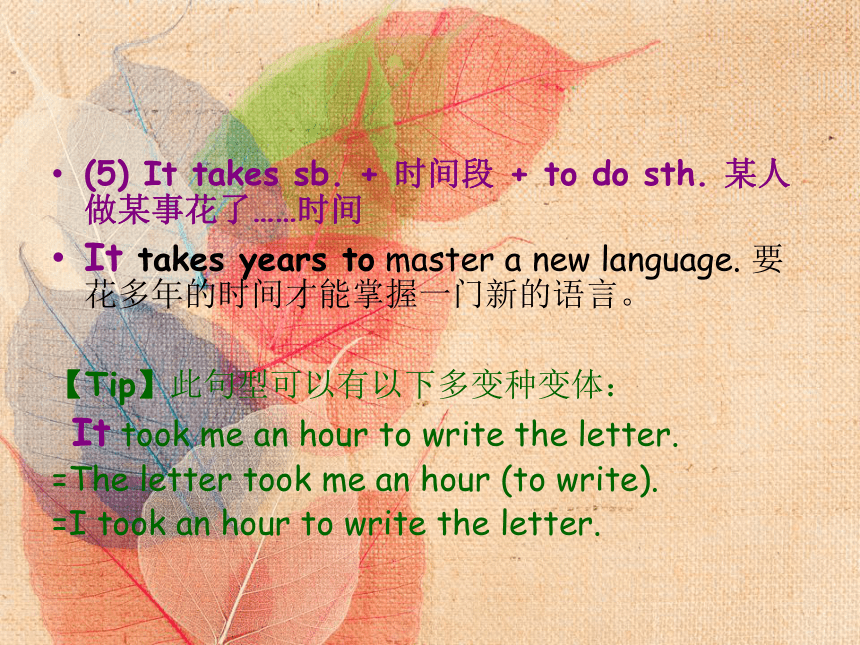
文档简介
(共37张PPT)
It的用法
1. It never rains but it pours !
2. It takes two to make a quarrel.
3. All time is no time when it is past.
4. It’s the thought that is the most important.
5. It is no use crying over spilt milk.
不鸣则已,一鸣惊人
一个巴掌拍不响
机不可失,时不再来。
礼轻情意重。
覆水难收。
NO.1 杂七杂八的 It
NO.2 形式主语的 It
No.3 形式宾语的 It
No.4 强调句型的 It
No.5 特殊用法的 It
No.6 习惯用法和固定表达的 It
一、杂七杂八的it 用法
1.主要用于指时间、距离、价值、天气、气候及温度等自然现象。
1. It is Friday today.
2. It was very cold last Monday.
3. It is about 8:30 now.
4. It is about 25km from Linquan to Fuyang.
5. It lies in the south of Anhui.
6. It is 40°C ! You got a high fever!
date
weather
time
distance
place
temperature
二、it用作形式主语
1. 基本用法
当不定式、动名词、从句等复杂成分用作句子主语时,为保持句子平衡,通常把真正的主语放在句末,而在句首使用形式主语it。如:
It’s very important to remember this. 记住这一点很重要。
It’s hard work climbing mountains. 爬山是费劲的事。
It’s unknown when he will come. 他什么时候来还不知道。
2. 用作形式主语的的重要句型
(1) it 作形式主语替代不定式
构成”It + be + adj. for (of) sb to do sth“ 某人做某事……
It is hard for him to make up his mind. 他很难下定决心。
It was foolish of her to say such a thing. 她说那样的话,真是太蠢了。
【Tip】介词 of 与 for 的区别是:
of 用于指某人的性格、属性、特征等,介词
for表示对象,意为“对……来说”
1, It’s very kind _____ you to say so
= You are very kind to say so.
2, It’s important _____ one to learn a
foreign language.
2) It is V-ed + that
① It is said (reported, learned) + that…
It is said that he has come to Beijing.
② It is suggested ( ordered, demanded, insisted, commanded) + that …
从句中的过去分词是表示请求,建议,命令等词时, that后的从句要用虚拟语气(should + V原形). Should可以省略。译为“据建议;有命令…”
It is suggested that the meeting (should) be put off.
.①It is hoped that you ________ there on time.
②It is advised that you ________ there on time.
A. arrive
B. should arrive
C. will arrive
D. both A and B?
析:①C,②D。句①是it作形式主语,that从句作真正的主语。主从句时态一致是解题的关
3) It is a pity (a shame) that…
That 后的从句一般用虚拟语气 (should+V原形), should 可以省略. 表示出乎意料,译为 ”竟然“。没有这种意义时,则不用虚拟语气。
It is a pity that such a thing (should) happen in your class.
4) It is necessary(important, essential,natural,strange) that…
that 后的从句一般用虚拟语气 (should+V原形), should 可以省略.
It is essential that _____________the old and the kids .照顾老人和孩子对我们来说是必须的。
作为一个中国人,爱护和保卫我们的国家是自然而然的事。(natural)
we should look after
As a Chinese , it is natural that we should love and protect our country
(5) It takes sb. + 时间段 + to do sth. 某人做某事花了……时间
It takes years to master a new language. 要花多年的时间才能掌握一门新的语言。
【Tip】此句型可以有以下多变种变体:
It took me an hour to write the letter.
=The letter took me an hour (to write).
=I took an hour to write the letter.
(6) It is up to sb to do sth. 该由某人做某事
得由你来作选择。
(7) If it were not for… / If it hadn’t been for… 若不是因为……
If it were not for their help, we couldn’t have got over the difficulties. 要不是他们帮助,这些困难我们不克服不了的。
要不是那起事故,他的女儿现在一定还活着。
If it hadn`t been for the accident, his daughter would be alive now
(8)it look (seem, appear, happen, ) that [as if]… 似乎……
It seemed as though he didn’t recognize me. 他似乎没认出我来。
It happened that I was out when he called. 他打电话时我碰巧不在家。
(8)it occurs to (hits, strikes) somebody that … 某人突然想起……
他突然想起他明天要参加一个重要的会议。
It occurs to him that he will attend an important meeting tomorrow
1. __________________ some students
Cheat in examinations at school.
众所周知学校一些学生考试作弊。
2.In my opinion, ________________ in exams because __ breaks the rules of schools.
以我之见,由于考试作弊是错的,因为它违反校规
It is known to us all that
it is wrong to cheat
it
三、it用作形式宾语
1. 基本用法
当不定式、动名词、从句等复杂成分用作宾语且其后跟有宾语补足语时,通常会在宾语补足语前使用形式宾语,而将真正的宾语移至句末。
其基本结构为“动词+it+宾语补足语+不定式(动名词或从句)”。如:
I find it difficult to do the job well. 我发现做好这件事不容易。
I think it best that you should stay here. 我认为你最好住这儿。
We think it no use complaining. 我们认为抱怨是没有用的。
sb think / find / consider/ make +
it + adj./n.+ to do / doing / that…
为了记忆方便我们可称该句型为“6123结构”。
6 指主句中常用的动词;think, believe, make,
find, consider, feel
1 指的是形式宾语 it;
2 指的是宾补的两种形式:形容词或名词;
3 指的是真正宾语的三种形式:不定式短语,
动名词短语或 that引导的宾语从句。
翻译下面句子
1.我们认为每天打扫教室是我们的责任。
2.他觉得把英语学好很重要。
3.他们发现要在两天内完成他们的工作很难。
We think it our duty to clean our classroom every day.
2) He felt it important to learn English well.
3) They found it difficult that they would
finish their work in two days.
(2) 动词 + it + when (if)-从句。如:
I dislike it when you whistle. 我不爱听你吹口哨。
We really appreciate it when she offered to help. 她来帮忙了,我们十分感激。
I’d prefer it if I didn’t have to do so much work. 要是我不必做那么多工作,好就太好了。
【说明】能用于此结构的动词不多,常见的有 enjoy, hate, love, like, dislike, appreciate, prefer 等。
(3) 动词 + prep + it + that-从句。如:
See to it that you’re not late again. 注意千万不要再迟到。
You may rely on it that he’ll come to meet you. 你放心,他会来接你的。
I always stick to it that you can do it .
我始终坚信你能,你一定行。
【说明】能用于此结构的动词不多,常见的有see to, reiy on, insist on, stick to, depend on, 等。
(4) 动词 + it + 介词短语+ that-从句。如:
I owe it to you that I am still alive. 多亏有你我才仍然活着。
I took it for granted that he would help us. 我认为他会帮助我们的。
【说明】能用于此结构的动词不多,常见的有take it for granted, bring it to sb’s attention, owe it to sb 等。
四、It 用于强调句型中
1) It + be+被强调部分 + that/who (a person) 从句
I met Tom in the park yesterday.
1) It was I who met Tom in the park yesterday.
2) It was Tom who I met in the park yesterday.
3) It was in the park that I met Tom yesterday.
4) It was yesterday that I met Tom in the park.
2) It is not until + 被强调的部分+ that…
该句型也是强调句型,主要用于强调时间状语,译成“直到…才…”,可以说是not… until… 的强调形式。
It was not until she took off her dark glasses that I realized she was a famous film star.
= Not until she took off her dark classes did I realize she was a famous film star.
= I didn’t realize she was a famous film star until she took off her dark glasses.
It is the ability to do the job__ matters not where you come from or what you are.
A. one B. that C. what D. it
It is / was + 被强调的部分 +that / who+句子其他成分
五、It的特殊用法
一、虚拟语气
(1)It’s (about / high) time + that-从句. 某人该做某事了。(从句谓语用过去式,有时也用“should+动词原形”)
It’s high time we left. 我们早该动身了。
It’s high time you bought a new car. 你该买辆新车了。
I think it’s high time that she made up her mind. 我想她该拿定主意了。
It’s high time they began to take you seriously. 现在他们应该开始认真对待你了。
(2) 与其他的虚拟结构不同,该结构不能在该用 was 时而用 were:
It’s time I was in bed. 我该上床睡了。(不用were)
2. 用于某些句型
It’s time for sth. 该做某事了。
It’s time to do sth. 该做某事的时候了。
It’s time for sb to do sth. 某人该干某事了。
It’s first (second) time + that-从句. 某人第几次干某事。(从句谓语用现在完成时)
It’s + 时间段 + since. 自从……有一段时间了。
It’s + 时间段 + before. 过多长的时间才… it’s=it was
It‘s + 时间段 + that. …多久了
It's + 时间段 + when ...是在某个时刻
It is time for breakfast.
It is time to have breakfast.
It is time for us to have breakfast.
It is the first time I’ve been here.
It is two weeks since I saw him
It's ten years before I graduated.
It's ten years that I've lived here for
It was ten years ago when I graduated
1、It be + 时间 + before …
It will be over a month before we end our classes .
It was not long before the police caught
the thief.
John think it won’t be long _____ he is ready for his new job. (2010陕西)
A. when B. after C. before D.since
C
2、It be + 时间 + since +---
1) It is two years since I was in the army.
2) It is two years since I joined the army.
延续性动词: live,run,stay,clean,play,hold,watch,teach,read,study,teach,eat,drink,write,dance, sing,smoke
瞬间性动词: open,stop,like,love,die,win,close,shot,begin,start enter,finish
3、 It + was +点时间+ when + S
+一过
It was ten o’clock when we began our lesson.
1.It’s years ___(since, before, after, that) my grandfather smoked.
2.It will be years ___(since, before, after, that) I paint this beautiful picture.
3.It was years ___(since, before, after,that) I painted this beautiful picture.
4.It’s for years ___(since, before, after, that) I have painted this beautiful picture.
易误辨析:
表示从since 从句谓语动作发生以后到现在所经过的一段时间,译为“自从......以来已多久了”
It is +时间段+since(过去时)...
表示从过去某一时间到before从句谓语动作发生所经过的一段时间,译为“多长时间后才/就做了…”
It + was + 时间段 + before(过去时)…
表示从现在起到before从句谓语动作发生所经过的一段时间,译为“多长时间后才会/就会做…”
It + will be +时间段 +before(一般现在时)…
_______
_____
______
____
Translate the following:
过了很久他才回来.
2. 我们很久后才会见面的.
3. 我离开这所学校已经很久了.
It was long before he came back.
It will be long before we meet again.
It is long since I left this school.
It is +时间段+since(过去时)...
It + will be +时间段 +before(一般现在时)…
It + was + 时间段 + before(过去时)…
易误辨析:
六、it 常用的固定搭配
常见的固定用法有:
make it 成功,安排在或定在某时间
forget it 别提了,忘了它吧
Don’t mention it 别提了,表示不用谢
It doesn’t matter 没关系
It(That) depends 视情况而定
You guessed it 你猜着了
It’s hard to say 很难说
It’s up to you to do sth. 由你来决定做某事
When it comes to 当谈到···的时候
Believe it or not 信不信由你
Take it easy 别紧张
It is typical of somebody to do sth 做某事时某人的一贯风格。
It remains to be seen that 拭目以待
It is your turn. 轮到你了。
It的用法
1. It never rains but it pours !
2. It takes two to make a quarrel.
3. All time is no time when it is past.
4. It’s the thought that is the most important.
5. It is no use crying over spilt milk.
不鸣则已,一鸣惊人
一个巴掌拍不响
机不可失,时不再来。
礼轻情意重。
覆水难收。
NO.1 杂七杂八的 It
NO.2 形式主语的 It
No.3 形式宾语的 It
No.4 强调句型的 It
No.5 特殊用法的 It
No.6 习惯用法和固定表达的 It
一、杂七杂八的it 用法
1.主要用于指时间、距离、价值、天气、气候及温度等自然现象。
1. It is Friday today.
2. It was very cold last Monday.
3. It is about 8:30 now.
4. It is about 25km from Linquan to Fuyang.
5. It lies in the south of Anhui.
6. It is 40°C ! You got a high fever!
date
weather
time
distance
place
temperature
二、it用作形式主语
1. 基本用法
当不定式、动名词、从句等复杂成分用作句子主语时,为保持句子平衡,通常把真正的主语放在句末,而在句首使用形式主语it。如:
It’s very important to remember this. 记住这一点很重要。
It’s hard work climbing mountains. 爬山是费劲的事。
It’s unknown when he will come. 他什么时候来还不知道。
2. 用作形式主语的的重要句型
(1) it 作形式主语替代不定式
构成”It + be + adj. for (of) sb to do sth“ 某人做某事……
It is hard for him to make up his mind. 他很难下定决心。
It was foolish of her to say such a thing. 她说那样的话,真是太蠢了。
【Tip】介词 of 与 for 的区别是:
of 用于指某人的性格、属性、特征等,介词
for表示对象,意为“对……来说”
1, It’s very kind _____ you to say so
= You are very kind to say so.
2, It’s important _____ one to learn a
foreign language.
2) It is V-ed + that
① It is said (reported, learned) + that…
It is said that he has come to Beijing.
② It is suggested ( ordered, demanded, insisted, commanded) + that …
从句中的过去分词是表示请求,建议,命令等词时, that后的从句要用虚拟语气(should + V原形). Should可以省略。译为“据建议;有命令…”
It is suggested that the meeting (should) be put off.
.①It is hoped that you ________ there on time.
②It is advised that you ________ there on time.
A. arrive
B. should arrive
C. will arrive
D. both A and B?
析:①C,②D。句①是it作形式主语,that从句作真正的主语。主从句时态一致是解题的关
3) It is a pity (a shame) that…
That 后的从句一般用虚拟语气 (should+V原形), should 可以省略. 表示出乎意料,译为 ”竟然“。没有这种意义时,则不用虚拟语气。
It is a pity that such a thing (should) happen in your class.
4) It is necessary(important, essential,natural,strange) that…
that 后的从句一般用虚拟语气 (should+V原形), should 可以省略.
It is essential that _____________the old and the kids .照顾老人和孩子对我们来说是必须的。
作为一个中国人,爱护和保卫我们的国家是自然而然的事。(natural)
we should look after
As a Chinese , it is natural that we should love and protect our country
(5) It takes sb. + 时间段 + to do sth. 某人做某事花了……时间
It takes years to master a new language. 要花多年的时间才能掌握一门新的语言。
【Tip】此句型可以有以下多变种变体:
It took me an hour to write the letter.
=The letter took me an hour (to write).
=I took an hour to write the letter.
(6) It is up to sb to do sth. 该由某人做某事
得由你来作选择。
(7) If it were not for… / If it hadn’t been for… 若不是因为……
If it were not for their help, we couldn’t have got over the difficulties. 要不是他们帮助,这些困难我们不克服不了的。
要不是那起事故,他的女儿现在一定还活着。
If it hadn`t been for the accident, his daughter would be alive now
(8)it look (seem, appear, happen, ) that [as if]… 似乎……
It seemed as though he didn’t recognize me. 他似乎没认出我来。
It happened that I was out when he called. 他打电话时我碰巧不在家。
(8)it occurs to (hits, strikes) somebody that … 某人突然想起……
他突然想起他明天要参加一个重要的会议。
It occurs to him that he will attend an important meeting tomorrow
1. __________________ some students
Cheat in examinations at school.
众所周知学校一些学生考试作弊。
2.In my opinion, ________________ in exams because __ breaks the rules of schools.
以我之见,由于考试作弊是错的,因为它违反校规
It is known to us all that
it is wrong to cheat
it
三、it用作形式宾语
1. 基本用法
当不定式、动名词、从句等复杂成分用作宾语且其后跟有宾语补足语时,通常会在宾语补足语前使用形式宾语,而将真正的宾语移至句末。
其基本结构为“动词+it+宾语补足语+不定式(动名词或从句)”。如:
I find it difficult to do the job well. 我发现做好这件事不容易。
I think it best that you should stay here. 我认为你最好住这儿。
We think it no use complaining. 我们认为抱怨是没有用的。
sb think / find / consider/ make +
it + adj./n.+ to do / doing / that…
为了记忆方便我们可称该句型为“6123结构”。
6 指主句中常用的动词;think, believe, make,
find, consider, feel
1 指的是形式宾语 it;
2 指的是宾补的两种形式:形容词或名词;
3 指的是真正宾语的三种形式:不定式短语,
动名词短语或 that引导的宾语从句。
翻译下面句子
1.我们认为每天打扫教室是我们的责任。
2.他觉得把英语学好很重要。
3.他们发现要在两天内完成他们的工作很难。
We think it our duty to clean our classroom every day.
2) He felt it important to learn English well.
3) They found it difficult that they would
finish their work in two days.
(2) 动词 + it + when (if)-从句。如:
I dislike it when you whistle. 我不爱听你吹口哨。
We really appreciate it when she offered to help. 她来帮忙了,我们十分感激。
I’d prefer it if I didn’t have to do so much work. 要是我不必做那么多工作,好就太好了。
【说明】能用于此结构的动词不多,常见的有 enjoy, hate, love, like, dislike, appreciate, prefer 等。
(3) 动词 + prep + it + that-从句。如:
See to it that you’re not late again. 注意千万不要再迟到。
You may rely on it that he’ll come to meet you. 你放心,他会来接你的。
I always stick to it that you can do it .
我始终坚信你能,你一定行。
【说明】能用于此结构的动词不多,常见的有see to, reiy on, insist on, stick to, depend on, 等。
(4) 动词 + it + 介词短语+ that-从句。如:
I owe it to you that I am still alive. 多亏有你我才仍然活着。
I took it for granted that he would help us. 我认为他会帮助我们的。
【说明】能用于此结构的动词不多,常见的有take it for granted, bring it to sb’s attention, owe it to sb 等。
四、It 用于强调句型中
1) It + be+被强调部分 + that/who (a person) 从句
I met Tom in the park yesterday.
1) It was I who met Tom in the park yesterday.
2) It was Tom who I met in the park yesterday.
3) It was in the park that I met Tom yesterday.
4) It was yesterday that I met Tom in the park.
2) It is not until + 被强调的部分+ that…
该句型也是强调句型,主要用于强调时间状语,译成“直到…才…”,可以说是not… until… 的强调形式。
It was not until she took off her dark glasses that I realized she was a famous film star.
= Not until she took off her dark classes did I realize she was a famous film star.
= I didn’t realize she was a famous film star until she took off her dark glasses.
It is the ability to do the job__ matters not where you come from or what you are.
A. one B. that C. what D. it
It is / was + 被强调的部分 +that / who+句子其他成分
五、It的特殊用法
一、虚拟语气
(1)It’s (about / high) time + that-从句. 某人该做某事了。(从句谓语用过去式,有时也用“should+动词原形”)
It’s high time we left. 我们早该动身了。
It’s high time you bought a new car. 你该买辆新车了。
I think it’s high time that she made up her mind. 我想她该拿定主意了。
It’s high time they began to take you seriously. 现在他们应该开始认真对待你了。
(2) 与其他的虚拟结构不同,该结构不能在该用 was 时而用 were:
It’s time I was in bed. 我该上床睡了。(不用were)
2. 用于某些句型
It’s time for sth. 该做某事了。
It’s time to do sth. 该做某事的时候了。
It’s time for sb to do sth. 某人该干某事了。
It’s first (second) time + that-从句. 某人第几次干某事。(从句谓语用现在完成时)
It’s + 时间段 + since. 自从……有一段时间了。
It’s + 时间段 + before. 过多长的时间才… it’s=it was
It‘s + 时间段 + that. …多久了
It's + 时间段 + when ...是在某个时刻
It is time for breakfast.
It is time to have breakfast.
It is time for us to have breakfast.
It is the first time I’ve been here.
It is two weeks since I saw him
It's ten years before I graduated.
It's ten years that I've lived here for
It was ten years ago when I graduated
1、It be + 时间 + before …
It will be over a month before we end our classes .
It was not long before the police caught
the thief.
John think it won’t be long _____ he is ready for his new job. (2010陕西)
A. when B. after C. before D.since
C
2、It be + 时间 + since +---
1) It is two years since I was in the army.
2) It is two years since I joined the army.
延续性动词: live,run,stay,clean,play,hold,watch,teach,read,study,teach,eat,drink,write,dance, sing,smoke
瞬间性动词: open,stop,like,love,die,win,close,shot,begin,start enter,finish
3、 It + was +点时间+ when + S
+一过
It was ten o’clock when we began our lesson.
1.It’s years ___(since, before, after, that) my grandfather smoked.
2.It will be years ___(since, before, after, that) I paint this beautiful picture.
3.It was years ___(since, before, after,that) I painted this beautiful picture.
4.It’s for years ___(since, before, after, that) I have painted this beautiful picture.
易误辨析:
表示从since 从句谓语动作发生以后到现在所经过的一段时间,译为“自从......以来已多久了”
It is +时间段+since(过去时)...
表示从过去某一时间到before从句谓语动作发生所经过的一段时间,译为“多长时间后才/就做了…”
It + was + 时间段 + before(过去时)…
表示从现在起到before从句谓语动作发生所经过的一段时间,译为“多长时间后才会/就会做…”
It + will be +时间段 +before(一般现在时)…
_______
_____
______
____
Translate the following:
过了很久他才回来.
2. 我们很久后才会见面的.
3. 我离开这所学校已经很久了.
It was long before he came back.
It will be long before we meet again.
It is long since I left this school.
It is +时间段+since(过去时)...
It + will be +时间段 +before(一般现在时)…
It + was + 时间段 + before(过去时)…
易误辨析:
六、it 常用的固定搭配
常见的固定用法有:
make it 成功,安排在或定在某时间
forget it 别提了,忘了它吧
Don’t mention it 别提了,表示不用谢
It doesn’t matter 没关系
It(That) depends 视情况而定
You guessed it 你猜着了
It’s hard to say 很难说
It’s up to you to do sth. 由你来决定做某事
When it comes to 当谈到···的时候
Believe it or not 信不信由你
Take it easy 别紧张
It is typical of somebody to do sth 做某事时某人的一贯风格。
It remains to be seen that 拭目以待
It is your turn. 轮到你了。
